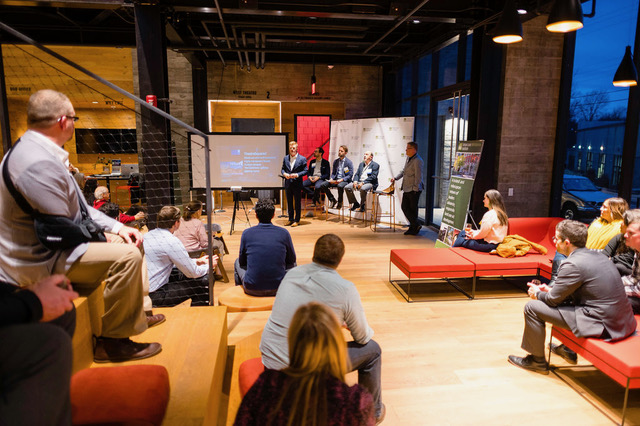Much like the natural world and its climate and wildlife influenced the behaviors of our earliest ancestors, the built environment is a principal partner to our behaviors today. It isn’t just where we live, where we learn, where we work, where we play and where every good and service we consume is found, although all of those things are true. The real power of the built environment is that it influences how we do those things, too. It, and the myriad systems and processes that operate within it, command a central role in both our conscious and subconscious decision-making each day — decisions that impact our health, finances, connections, opportunities and general fulfillment. It is because of our belief in the power of the built environment that the Urban Land Institute exists.
As the fastest-growing region in the state and among the fastest in the country, Northwest Arkansas’s built environment looks, functions and feels much different today than it did only one generation ago; and, assuredly, it will look, function and feel much different a generation from now. Current projections indicate our metro area will double in population between now and 2050, at which time more than 1 million residents will call this corner of the heartland home. Accompanying these new residents will be tens of thousands of new homes, tens of millions of square feet of new commercial development, dozens of new schools and untold acres of parks and public spaces, all served by thousands of miles of new infrastructure. Ensuring that we provide every resident — current and those yet to arrive — a built environment that sustains the character, high quality of place and competitive advantages we currently enjoy is an opportunity that falls on the leaders of our real estate development and land-use planning industries. Because of this, ULI Northwest Arkansas exists.
ULI Northwest Arkansas is a district council of the Urban Land Institute, a global organization that for more than 80 years has been dedicated to shaping the future of the built environment for transformative impact in communities worldwide. We are a trusted and relied-upon network of leaders advancing responsible land use and development, made uniquely powerful by our cross-disciplinary member network of real estate developers, builders, finance and equity professionals, architects, engineers, urban planners, elected officials, engaged citizens and more. ULI NWA regularly assembles leaders from across the region and the country to collaborate on solutions to some of our region’s most vexing challenges, exchange best practices for development and land-use policy and gain new knowledge through ULI’s professional education, technical services, applied research and case studies and publication library.
Right now, ULI NWA is focusing in a big way on housing affordability and choice. Conventional wisdom posits that affordability will be maintained through “drive until you can afford it” sprawl. But that model hasn’t worked particularly well in other regions and it won’t here either, because it simply trades housing costs for transportation costs (and precious time spent commuting) at the expense of valuable farmland, open space and access to goods, services and amenities. We believe that Northwest Arkansas has the chance to upend conventional wisdom by embracing wise alternatives to costly sprawl. Achieving success will demand that the cities of our region sufficiently revise many of the zoning and subdivision policies that dictate both the location and forms of new housing stock. To that end, we’re hosting a city planner community of practice forum throughout this year to fully understand this challenge, gain expertise in a range of possible solutions and create a policy roadmap for each city involved.
We’re also providing technical assistance to the city of Bentonville in the form of a land-use fiscal impact analysis. In partnership with Joe Minicozzi and his team at Urban3, we will do the math on the city’s built environment, offering a unique spatial evaluation of the budget from both the revenue and expense sides. The final report will indicate to city decision-makers which built environments are the most powerful contributors to the city coffers as weighed against the cost of infrastructure for the same areas; and conversely, which built environments are net consumers of those same coffers. Studies like this make the business case for smart land-use policy decisions, and we’re excited to deliver this valuable research to city leaders this fall.
Finally, the ULI NWA Place Summit 2022, coming Nov. 14-16, promises to be one of the most important events on the calendar, with a multistate audience heading our way to gain valuable insights and engage in meaningful conversations focused on four core topics: place, housing, transportation, and industry access and acceleration.
All this and more, and we’re still delivering on a monthly event calendar full of great content and networking, including site tours, keynote and panel presentations, workshops, webinars and more. Keep up with our programs or simply learn more about ULI NWA by visiting arkansas.uli.org.
One of my favorite quotes is from Sir Winston Churchill, delivered during an address to Parliament following a particularly scary series of blitzkrieg bombings that destroyed both the Commons Chamber itself and much of the city of London: “We shape our buildings; thereafter they shape us.” He was referring, of course, to the rebuilding effort they faced and why it was so important to get it right. I kept his words on a Post-It above my desk for over a decade while serving as a city planner so I would never forget why my job mattered. They ring as true today as they were for Londoners three generations ago.
Everything in our built environment is a choice, and each of these choices has a direct and demonstrable impact on the lives, livelihoods and lifestyles made available to every resident of every city and town on earth. The power of the built environment cannot be overstated because it shapes us all each day in countless ways. Our Urban Land Institute Northwest Arkansas members and network of supporters recognize this belief as core to our mission, and we strive to advance those policies and practices that deliver the best possible built environment to the residents of our region, for today and for the future. Because it matters.
Wes Craiglow, AICP, is the executive director at the Urban Land Institute of Northwest Arkansas and the former deputy director of planning for the city of Conway.



